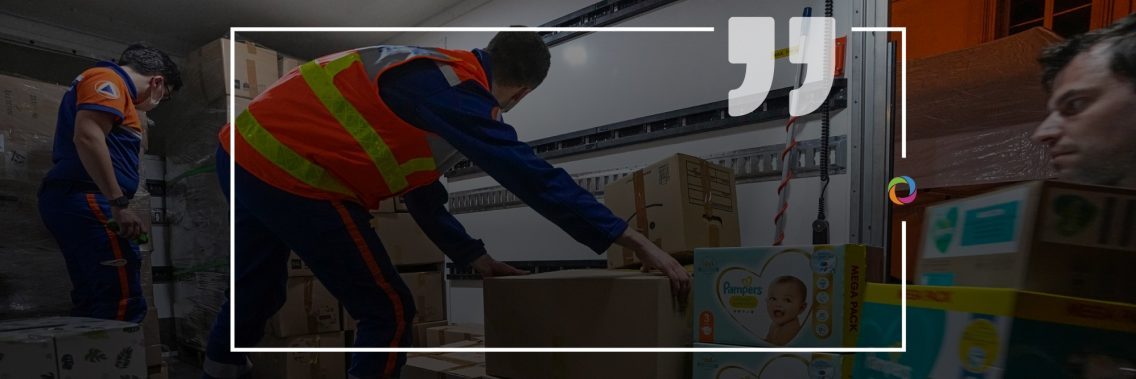Despite the dramatic consequences of the coronavirus pandemic on the world economy, in 2021 development aid from rich nations recorded an increase, reaching a record US$179 billion. But two months into 2022, Russia invaded Ukraine and a full-scale war began right next to the EU, one of the biggest aid donors. As the conflict escalates and experts agree that its end is nowhere in sight, aid donors are under pressure yet again to make choices and set foreign aid priorities. Will the Ukraine crisis mean international aid is pulled from the rest of the world? We asked a few experts to elaborate on this matter. Check out their opinions below.
Key Takeaways:
- Experts mention that aid flows to Ukraine are likely to affect the distribution of aid in countries like Yemen, Syria, South Sudan, and Myanmar or even cause disruptions in refugee support in Germany, Turkey, and Italy.
- Increasing military budgets in the U.S., the UK and Germany may have a critical impact on the future of humanitarian aid since these countries account for more than half of the total aid spent worldwide.
- The U.S. announced a US$13.6 billion aid package to Ukraine but should not have a significant impact on the distribution of aid globally in the short term. However, the situation will change quickly if the crisis spreads.

“The war in Ukraine and the aid directed to that country will definitely affect the distribution of aid in Yemen, Syria, South Sudan, and Myanmar which are among the countries that need continuous support from the donor community. At the same time, African and MENA refugees in Germany, Turkey, and Italy, as well as some Asian countries hosting refugees, will also be affected by funding shortages as all eyes are looking to support Ukraine as a priority. Indeed, with over 3.6 million refugees fleeing Ukraine in under a month, with the majority settling in Poland and Romania, humanitarian aid is needed quickly to support people and the hosting countries. The crisis has already displaced 7.1 million people according to the International Organization for Migration and inside Ukraine, this number is expected to increase rapidly should the war continue. The humanitarian needs inside and outside Ukraine are swiftly multiplying. While Ukraine is a priority, other humanitarian needs elsewhere should not be neglected. ”

“While financing the war in Ukraine and the provision of guns to Ukraine can be seen as legitimate by the international community, people’s lives, especially in developing countries, are not the same as before the COVID-19 pandemic and the ongoing global economic crisis. According to an OXFAM report, the combined impacts of COVID-19, inequality, and food price hikes could result in 263 million more people living in extreme poverty this year, resulting in 860 million people living below the $1.90-a-day extreme poverty line. Also, based on past experiences, political analysts predict that an increase in defense budgets in the US and the UK and sending war weapons to Ukraine would likely create new micro wars and conflicts once the war in Ukraine ends which means new waves of the refugee crisis and the need for more humanitarian aid. More military investment in the USA and the UK is also critical for the future of humanitarian aid financing worldwide since the USA, the UK, and Germany account for 61% of total donor contributions to humanitarian aid. On the other hand, there is a massive community in the world needing humanitarian assistance. According to the Global Humanitarian Assistance Report, 243.8 million people in 75 countries were assessed as needing humanitarian assistance in 2021, and in 2022 global humanitarian needs have increased faster than ever while the growth of humanitarian aid has stalled. When I interpret all this data, I can say that there is a trend toward decreasing humanitarian aid budgets on the pretext of aiding the war in Ukraine although there is an increasing need for more humanitarian aid in the world. Also, we know that women, children, and all vulnerable groups are always more adversely affected by conflicts and wars so the governments of the UK and the USA should be cautious when cutting humanitarian aid budgets. I strongly advise governments to prioritize the lives of women, children, and all vulnerable groups and carefully reassess their long-term strategies, and remember their global responsibilities.”

“In late January 2022, three countries in South Africa – Madagascar, Mozambique, and Malawi – were hit by several tropical cyclones. At the same time, 12,000 km North, on the border of the EU, tensions between Russia and Ukraine grew and ended up in a full-scale war in late February. These two disasters, one natural and the other man-made, are both acute emergencies that have caused a significant loss of lives, loss of livelihoods, and infrastructural damage disturbing the normal way of life of people. They both needed urgent emergency response assistance. However, two months down the line, there is a huge difference in the levels of humanitarian aid flowing to these two regions. The nature of the conflict in Ukraine is such that it is very much linked to the geopolitical interests of Western countries that also happen to be major donors of humanitarian aid. As such, these countries have knowingly or unknowingly diverted their attention from the rest of the existing and new emergencies to protect their interests associated with the Russia-Ukraine conflict. This has resulted in dwindling aid to existing emergencies and low humanitarian aid to other new emergencies such as the response to tropical cyclones in southern Africa. A similar level of tropical cyclone disasters in 2019 received generous humanitarian aid flows compared to the current levels. COVID-19 aside, it is clear the Russia and Ukraine conflict has played a major role in low humanitarian aid for other disasters elsewhere.”

“Financial aid plays a big role in Africa and, as an African, my fear is that despite efforts from the large donors to keep their aid promises, the situation in Ukraine, should it persist, could force them to review their pledges. Countries like Mozambique are still rebuilding themselves from extreme events such as cyclones, floods, drought, the COVID-19 pandemic, and other development issues and a great deal of funding to responding to these crises comes from large donors who, despite their will to continue to provide aid, eventually will have to give priority to the situation in Ukraine amid fears that this crisis could reach their territories. It wouldn’t be a surprise if some of these aid commitments were to be reviewed to address other pressing issues such as the potential food shortage given that the two countries involved in the war supply a great deal of grains and other food products to the world. On the other hand, I see that there is an opportunity for nations, particularly those that are in need of this aid, to take a step towards their own self-sufficiency. This is a big ask and I recognize that some countries have still been independent for only a few years but the timing is perfect.”

“Since the war in Ukraine, we have seen the work of many civic organizations aiding every need of the Ukrainian diaspora spreading within the EU and other European countries that were not part of the bloc at the first stage. Even though we have other international humanitarian crises like Yemen, Ethiopia, Roghinyian, and Syria, for example, the eyes of the international community are on the plight of refugees from Ukraine. In this respect, the humanitarian budget for international aid will turn to the Ukrainian crisis. It was a predictable result for all the events that the war entails, even more so by having an open investigation by the Prosecutor Office of the International Criminal Court (ICC). An example is the massacre of thousands of civilians in Bucha; according to some researchers in the fight against child sexual abuse material online, there have been reports of graphically-recorded crimes against humanity circulating through the Dark Web related to the matter. In this regard, the Office of the Prosecutor of the ICC will need a taskforce to surf the Dark Web to obtain these images under fumus boni iuris (presumption of sufficient legal basis) and periculum in mora (the danger of delay).”

“In the aid world, sudden emergencies are a constant. With government donors, aid is pre-planned and part of the overall budgeting process with contingencies built in, in terms of earmarked allocations determined by a government’s foreign aid division. The US President recently signed an emergency spending package of USD 13.6 billion in aid to Ukraine, with half going to military spending and the majority of the remainder on humanitarian relief and disaster relief. In the short-term, it should not have a significant impact on the distribution of aid globally with the major public donors or government donors like USAID; however, the situation will change quickly if the crisis spreads. One interesting development to watch is the crowdfunded source of aid from individuals worldwide directly to the citizens of Ukraine, bypassing NGOs.”
Check out more than 600 job opportunities in the Humanitarian Aid sector here.

